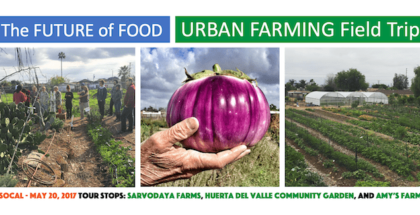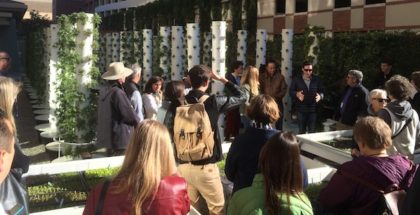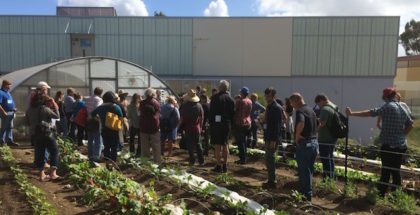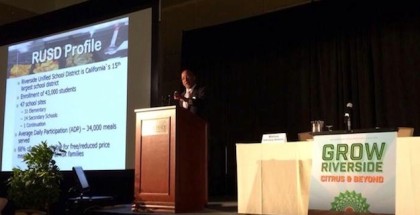Posts By Robert Puro
‘Future of Food’ Urban Farming Field Trip to Explore Urban Ag Endeavors in Inland SoCal
April 4, 2017 | Robert PuroSlated for Saturday, May 20, 2017 the ‘Future of Food – Urban Farming Field Trip’ will visit a series of innovative urban farming ventures in Inland Southern California that have emerged to grow the local food marketplace, increase food access, educate local communities, advocate for food equity, and improve health and nutrition. The field trip hosted by Seedstock, a social venture that seeks to foster the development of sustainable local food systems, will also include lectures from experts in urban farming.
The tour is the third in a series of Seedstock ‘Future of Food’ field trips that was recently launched to facilitate the exploration of food system innovations that are generating economic and community capital. Read More
‘Future of Food’ Field Trip Explores Commercial and Community Driven Urban Farms in Los Angeles, CA
January 30, 2017 | Robert Puro
Attendees of the Seedstock ‘Future of Food – Urban Ag Field Trip’ at USC Teaching Garden, learning about the farm’s aeroponics operations from LA Urban Farms’s Wendy Coleman and Niels Thorlaksson. Photo credit: Robert Puro, Seedstock.
On Friday, January 27, Seedstock hosted the inaugural ‘Future of Food – Urban Ag Field Trip’, which provided attendees an excursion into the diversity of urban farming and state-of-the-art hydroponic, aquaponic and aeroponic agriculture operations in Los Angeles County, the most populous county in the U.S. The sold out tour treated participants to lectures and sessions from pioneering farmers who are embracing innovative business models and growing systems to both increase food security and take advantage of the escalating demand for local food.
The tour kicked off with a stop at The USC Teaching Garden, a joint venture between L.A. Urban Farms and USC Hospitality, which utilizes aeroponic tower gardens to challenge the food systems status quo on campus. The garden was established to supply fresh produce to the university’s on-campus restaurants, dining halls, catering services, and hotel, while also teaching students and staff about flavor and sustainability. Attendees heard from Chef Eric Ernest, Executive Chef of USC Hospitality, discuss the economic viability of the garden. Chef Ernest noted that the garden is not just for show, and that its 90 aeroponic garden towers grow enough food for campus retail units to break even each year. “The garden is about connecting chef and customer,” said Chef Ernest. We also heard from L.A. Urban Farms founder Wendy Coleman, and partner Niels Thorlaksson, discuss the technical details of the farm, its water usage, and maintenance requirements. Thorlaksson explained that each aeroponic garden tower utilizes 5 – 10 gallons of water per week. Read More
Urban Ag Field Trip to Explore Innovative Farming Operations in L.A. County
December 15, 2016 | Robert PuroUrban agriculture ventures of all different stripes – from commercial hydroponic enterprises and rooftop aeroponic farms to community gardens planted atop formerly vacant lots – are not only disrupting the food system, but also generating community and economic capital.
To give you an up close and personal look at a series of innovative urban farming operations that have emerged to tackle challenges to food access, meet marketplace demand for local food, and increase food security, Seedstock has put together the ‘Future of Food – Urban Ag Field Trip’.

Slated for Friday, January 27, 2017, the field trip will look at the community and economic development potential of urban farming. Tour stops include the USC Teaching Garden, Local Roots Farms, and The Growing Experience.
Scheduled for Friday, January 27, 2017, the field trip will look at the impact of urban farming in Los Angeles County, the most populous county in the United States, and include lectures on such topics as the past, present, and future of urban agriculture, vertical farming, and sourcing local food from urban farms. Read More
Grow Local OC Conference Delves into the Future of Urban Food Systems in Orange County and Beyond
November 15, 2016 | Robert Puro On Nov. 10-11 hundreds of attendees from across Southern California and beyond showed up for the inaugural Grow Local OC Conference: The Future of Urban Food Systems held Nov. 10-11 in Orange County, CA at California State University, Fullerton to learn more about the community and economic development potential of fostering local food systems in cities.
On Nov. 10-11 hundreds of attendees from across Southern California and beyond showed up for the inaugural Grow Local OC Conference: The Future of Urban Food Systems held Nov. 10-11 in Orange County, CA at California State University, Fullerton to learn more about the community and economic development potential of fostering local food systems in cities.
The conference attendees were treated to lectures from the foremost urban farming experts, entrepreneurs, and community advocates in the sustainable and local food system space. Topics explored by the speakers and panelists included the role that food plays in bridging the rural urban divide, Read More
Riverside’s Fox Farm Seeks to Raise Funds to Sustain Its Urban Farming Endeavors
October 16, 2015 | Robert PuroFox Farm is an urban farm location at Hapemen Ranch, a 2.5 acre orchard with 75 various fruit tree. This farm is completely surrounded by houses and located in the heart of Riverside CA. Farmer Scott Berndt has cultivated about a 1/3 of an acre of vegetables, which he provides to local restaurants in Riverside as well as to the Riverside Unified School District through its Farm-to-School program.
Scott’s goals are to bring a full acre into production, growing various kinds of vegetables that are needed for RUSD and local restaurants. His biggest challenge is growing enough variety to supply restaurants with their entire menu of produce.
Scott’s goal is to acquire and install a walk in cooler on the farm, and grow what he can for restaurants and RUSD. He plans to source the items he does not have available from other local farms, and provide a one stop place for local chefs and restaurant owners to pick up produce rather than have to visit 2-3 farms for their needs.
Scott is currently raising funds to try to obtain a Kiva Zip loan for a walk in cooler. His funding campaign expires in just 7 days and he is 86% funded. Starting today, a benefactor has opted to match the dollars of any loan.
That means with $700 left to be funded, a minimum $25 loan from you is worth $50! Only 14 lenders at the $25 level secures the project! Only 7 lenders at $50! Be proud, this is how real change happens, at the grassroots. We can do this, you can help!
Follow this link: https://zip.kiva.org/loans/16345
Find out more about Fox Farm: http://berndtsplants.blogspot.com/
Hurry! LAST Day to Register for Urban Ag-Focused GrowRIVERSIDE Conference
June 10, 2015 | Robert PuroCreating a vibrant local food system requires that cities explore how to develop new markets for their local farmers, foster entrepreneurship and innovation as it relates to the production of food and encourage responsible and sustainable farming that benefits community, economy and environment. The development of effective food policy that advances agricultural economic development and infrastructure and fosters education about food and urban farming is also essential.
Expert speakers set to participate in the 2nd Annual GrowRIVERSIDE Conference: The Future of Local Food will dive deeply into all of the above mentioned areas, and more, to come up with solutions designed to guide Riverside and cities across the country in the development of vibrant and sustainable local food systems. The conference begins in TOMORROW on June 11, 2015 at The Riverside Convention Center in Riverside, California.
Limited Tickets Remain! Register here: http://growriverside.eventbrite.com
The conference will cover a number of topics that will appeal to a diversity of audiences from growers and entrepreneurs to city planners, researchers and citizens interested in learning about how they can play a role in building their local food system. Select topics include:
Building the Future of Local Food – Lessons in Launching a Local Food Enterprise
June 1, 2015 | Robert PuroStarting up and funding a local food-focused small business – from launching a new farm to creating a value-added product (jam for example) using local products – is both exciting and challenging. To offer guidance, support and information on the steps that entrepreneurs can take to give their fledgling business endeavors the greatest chance to succeed and thrive, Paul Smith, Business Development Specialist for the U.S. Small Business Administration, along with a team of start up business experts will lead a breakout session at the upcoming GrowRIVERSIDE Conference entitled, “Launching and funding a local food enterprise.”
This session will provide prospective and existing entrepreneurs with insight into how to get their businesses off the ground via an explanation of core business creation steps – from business planning, accessing capital, marketing, sales, and more.

Paul Smith, Business Development Specialist for the U.S. Small Business Administration, will lead a breakout session at GrowRIVERSIDE focused on helping food entrepreneurs build their businesses.
Paul Smith is an accomplished professional with twenty-five years experience in business development. His career encompasses both the private and public sectors. His experience includes sales management, direct marketing, export promotion, and matchmaking, for markets worldwide. As Business Development Specialist for the U.S. Small Business Administration Mr. Smith is responsible for outreach to the business community for the Santa Ana District office.
Paul’s session will be comprised of a group of accomplished entrepreneurs and business development specialists including:
Nicole Kinney, Director of the Inland Empire Women’s Business Center (IEWBC)
Vincent McCoy Director of the Inland Empire Small Business Development Center
Diana Cescolini Professor of Accounting, Entrepreneurship, Business, & Management and Chapter Chair for SCORE Inland Empire
Anthony Lattner Chief Instructor for Cal Poly Pomona’s Sustainable Agriculture Training (SAT) program at Archi’s Acres
There are only 10 days left until the conference and tickets are going fast, so register now to attend this session and learn how to give your local food-focused business the best chance for success!
Register Here: http://growriverside.eventbrite.com
If you’re looking for more information on the 2016 3rd Annual GrowRIVERSIDE Conference: Cultivating the Future, you can find out more about the program here and register here!
From Food Access to Entrepreneurship, Keys to Building a Strong Local Food System
May 30, 2015 | Robert PuroTo build a strong local food system cities must examine how to increase food access to citizens living in food deserts in need of fresh and healthy food. The development of effective food policy that advances agricultural economic development and infrastructure and fosters education about food and urban farming is also essential. So too is support for the development and start-up of new local food-focused business ventures.
Expert speakers set to participate in the 2nd Annual GrowRIVERSIDE Conference: The Future of Local Food will dive deeply into all of the above mentioned areas, and more, to come up with solutions designed to guide Riverside and cities across the country in the development of vibrant and sustainable local food systems. The conference begins in only 12 days on June 11, 2015 at The Riverside Convention Center in Riverside, California.
Select GrowRIVERSIDE Conference breakout session topics include:
Market Development for New Farmers – featuring:
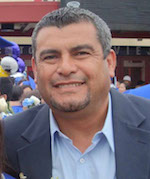 Ramiro Lobo has been the Small Farm and Agricultural Economics Advisor for the University of California Cooperative Extension in San Diego County since 1997. Ramiro is one of several Farm Advisors affiliated with the University of California Small Farm Program and his primary responsibility is to conduct research and educational activities to support small-scale agricultural producers in San Diego County. Ramiro’s work focuses primarily on educating small scale producers on topics related to agricultural business and risk management, new crop development and evaluation, new entry grower education, market development through agricultural tourism and direct marketing, and Food and pesticide safety education. Read More
Ramiro Lobo has been the Small Farm and Agricultural Economics Advisor for the University of California Cooperative Extension in San Diego County since 1997. Ramiro is one of several Farm Advisors affiliated with the University of California Small Farm Program and his primary responsibility is to conduct research and educational activities to support small-scale agricultural producers in San Diego County. Ramiro’s work focuses primarily on educating small scale producers on topics related to agricultural business and risk management, new crop development and evaluation, new entry grower education, market development through agricultural tourism and direct marketing, and Food and pesticide safety education. Read More

